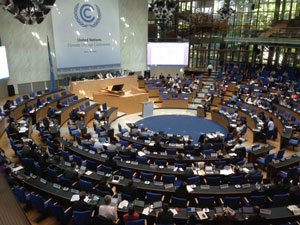ADP negotiations in Bonn
 With less than 200 days to go until COP 21 in Paris (1-11 December), governments have just completed the first week of a two-week negotiation in Bonn to prepare a new comprehensive agreement to tackle climate change. With over 2,000 government representatives and 1,500 observers, conference rooms in the newly opened World Conference Centre have been crowded.
With less than 200 days to go until COP 21 in Paris (1-11 December), governments have just completed the first week of a two-week negotiation in Bonn to prepare a new comprehensive agreement to tackle climate change. With over 2,000 government representatives and 1,500 observers, conference rooms in the newly opened World Conference Centre have been crowded.
The aim of this meeting and two further week-long meetings (end-August and October) is to reduce the 90-page negotiating text created in February 2015 in Geneva to a shorter text from which Ministers can reach an agreement on the final Paris treaty. Progress during the first week has been slow. Government delegates have been trying to consolidate existing paragraphs and options in the Geneva text as well as to remove duplications without deleting any concepts within the text. In a room full of people all of whom have instructions on how much ground that they can give on their own national positions, this is difficult.
After three days of intensive work with some sessions finishing as late as 9pm, only 5% of the text has been reduced. It is hard, however, to think of a better way to structure the work given the broad range of topics including: mitigation, adaptation, technology, finance, capacity building, transparency, cycles, plus preambular text and the legal form of the final treaty. A stocktaking meeting on Saturday will determine how to speed up progress. Many governments are lamenting the slow progress but they are also the cause.
The Subsidiary Bodies for implementation (SBI) and for Scientific and Technological Advice (SBSTA) are meeting in parallel alongside the ADP meeting. The former is carrying out a multilateral assessment on the national submissions of developed countries with firstly presentations of their emission reduction achievements and future plans followed by an open question and answer session during which other governments ask tough questions (for example, Germany being asked why their national reduction target is greater than that of the EU).
Among other topics, the SBI is dealing with the review of the Clean Development Mechanism (CDM), little progress is expected until after the Paris Agreement has been concluded. The CDM is especially important for African nations and has resulted in thousands of small and large emissions reduction projects.
The SBSTA is also working on many subjects. The one closest to business interests is the development of a new Market Mechanism for post-2020. The first four hours of discussion have made little progress primarily as it is difficult to agree upon how such a mechanism should work without knowing the structure of the long-term climate agreement in which it will fit.